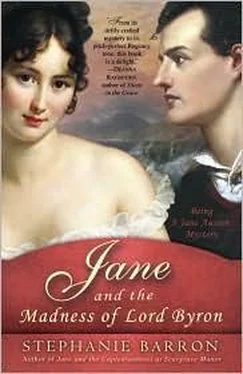Madame promised faithfully to send round the lavender silk on the morrow, with the rest of the gowns to follow; then turned her blunt features upon me. Was there anything Miss Austen required?
I saw, to my regret, that the hour was now too advanced to permit of my own frivolity and a nuncheon with Henry, and informed Madame of the unfortunate fact of a previous engagement—promised to return at the first opportunity—and accompanied Mrs. Silchester as she quitted the establishment.
“I must assume that tho’ we cannot attend the funeral itself,” I observed as we walked back along North Street in the direction of the Steyne, “that we ought, in good conscience, to pay a call of condolence upon the General at the conclusion of the service. Surely there will be any number of Brighton’s notables who shall do the same?”
Mrs. Silchester hesitated. “In truth, the General lives so quietly—and tho’ commanding respect, has never sought a broad acquaintance among the first families in the town—I cannot undertake to say whether he shall be receiving or not. However,”—and she squared her shoulders a little—“that shall not prevent me from paying a call. I hope that I know what is due to that poor lost darling, tho’ her father may not. I hope I am conscious of what her mother should have wished, on the occasion.”
Here was my opening. “She died some years since, I collect?”
“When Catherine was but three years old, and her brother seven. Richard had already been sent away to school, of course, and Catherine was in the care of her nurse when Lydia … but that is ancient history, my dear Miss Austen, and cannot be of interest to yourself.”
“I hope you will not think me inquisitive,” I returned with an air of apology, “but the General was so indiscreet as to speak of his late wife in a manner I found rather shocking. I attempted to pay a call on him only yesterday, to offer my sympathy at the loss of his daughter; but he refused to admit me, and so far forgot himself as to declare that the sins of the mother had been visited upon the child . Naturally, I could not know what to think. I ascribed it to the excesses of grief.”
“Ye-es,” Mrs. Silchester said hesitantly, “tho’ with my knowledge of the General, I should be inclined to call it spite rather than sorrow. You will forgive me for speaking frankly, Miss Austen—the General is not an amiable man. Dear Lydia was quite otherwise—possessed of perhaps too much sensibility, indeed—and a more ill-sorted pair I never hope to encounter again.”
“The marriage was unhappy?”
“She fell in love with a red coat, I fear—and never gave a thought to the nature of the gentleman who wore it.”
“Many ladies might say the same, to their infinite misfortune,” I offered piously.
“But few with poor Lydia’s result.”
Poor Lydia . It might be a veritable quotation from my own pen.
And as we walked towards the King’s Arms and my expected nuncheon, Mrs. Silchester shared her friend’s sad history.
Chapter 22 A Passion for Publick Houses
THURSDAY, 13 MAY 1813
BRIGHTON, CONT.
“IT IS QUITE A DISMAL TALE, HENRY,” I WARNED AS THE potboy set a tankard of ale, half a cold ham, some new-baked bread, and a Stilton cheese before us. I was drinking lemonade. We were seated in the King’s Arms’ coffee room among perhaps half-a-dozen other parties, with the horde of more common folk collected in the Ordinary beyond the communicating passage, and the cheerful din made the perfect foil for intimate conversation. The Arms was a handsome-enough old publick house, broad-beamed and low-ceilinged, with smoke-darkened walls and ample hearths. Henry had already informed me that the Regent had been frequently revelling here in his salad days—before Mrs. Fitzherbert or the unfortunate marriage to his cousin Princess Caroline—and that the carousing of the 10th Hussars, whose preferred publick house it was, could be as nothing to the example His Royal Highness had once set.
“No local maiden was safe from his party,” Henry observed. “And the gallons of wine and ale that were drunk! The publican, Mr. Tolliver—who has lived in the Arms, man and boy, his father being publican before him—says there was nothing to equal Prinny’s lust for life, in his youth. The reputation of the house grew so tarnished among the gentry, indeed, that Mr. Tolliver’s father very nearly barred the Prince from the premises—but for the uncomfortable fact of his being the Prince. But you were speaking of General Twining: Pray forgive my interruption.”
“I fear that what I have to relate is less amusing.” I allowed my brother to serve me a cut of ham. “General Twining was once himself a member of the 10th Hussars, as should not be unusual; and while in London a quarter-century ago, met and married a beautiful young heiress named Lydia Montescue—only then in her first Season. He was thirty; she was but seventeen, and wild for a red coat, as Mrs. Silchester would have it—the two ladies were together at school, and remained friends ever after. As is so often the case, poor Lydia discovered that she had married a stranger on the strength of three weeks’ acquaintance, several balls, and a drive or two in Hyde Park—who proved, as a life partner, harsh and incomprehensible: so strict a disciplinarian, that her frivolous pleasures were at an end; so parsimonious a master, that her ample purse was hers no longer; and so jealous a husband, that she might not stand up with one of his fellow officers at a garrison ball, without earning a blow from his hand. In short, she left the General—who was but Major Twining then—when her son was five and her daughter an infant still in arms.”
“Eloped with another?” Henry suggested.
“One of her husband’s cavalry officers—Captain the Honourable Philip Barrett, Mrs. Silchester persisted in calling him, as tho’ his courtesy title lent greater glamour to his memory. Captain Barrett was the second son of the Earl of Derwentwater, she tells me, and exquisitely expensive—being addicted to gambling. Poor Lydia appears to have possessed appalling taste in men.”
“Fellow ditched her?”
“I am sure his family would have preferred him to have done so. In the event, Twining pursued them, challenged the Honourable to a duel—and killed him at twenty paces.”
“Good Lord!” Henry almost choked on his ham. “And having put his rival below ground, Twining did not feel obliged to flee to the Continent?”
“He stood his trial, and was acquitted the crime of murder on the plea of having defended his honour—the first duty of any soldier or gentleman. Mrs. Silchester, however, could not quite condone such violence. I believe she was as smitten as all the rest with the dashing Captain. A tragedy , she called it.”
“And Lydia?—She was hauled back to do penance, I suppose?”
I shook my head. “Having killed her lover, Twining cast off his wife without a penny, Mrs. Silchester says. Lydia died in extreme poverty in a back slum of London when Catherine was but three years old, and lies in an unmarked pauper’s grave. Mrs. Silchester knows this to be true, because she received a letter from the vicar of St. Martin-in-the-Fields, which parish had the burying of Mrs. Twining; Mrs. Silchester’s direction was found among the unfortunate lady’s effects, when she had died.”
“And the Montescues? They made no effort to support her? They allowed their Lydia to end in misery?”
“She was an orphan, I understand—which accounts for her considerable fortune, which fell entirely to General Twining’s use.”
“Melancholy,” Henry observed. “And do but consider, Jane, how little his course in life has availed him—only son killed in the Peninsula, and now his daughter snuffed out in violence.”
Читать дальше












